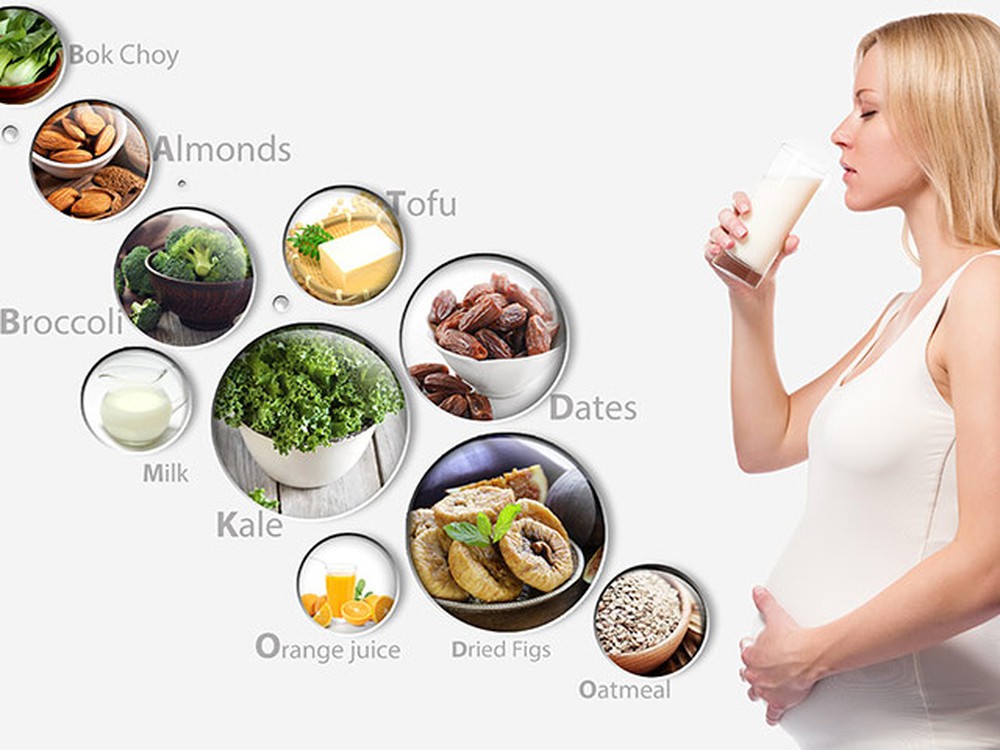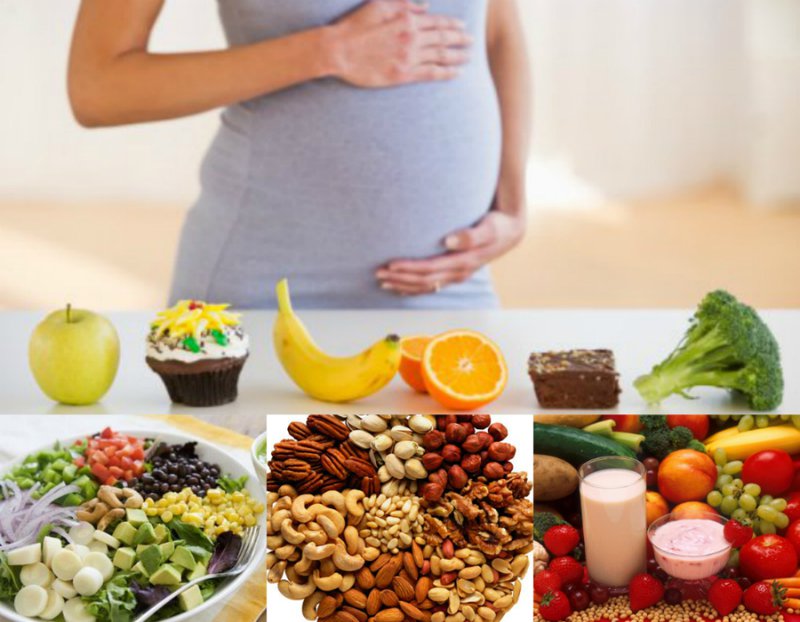Diet before pregnancy? What should mom and dad eat? (part 1)

Preconception nutrition studies show that good food and nutrition are especially important for the reproductive health of both women and men. In addition, there are also foods that are not physiologically beneficial that need to be stopped. If you are planning to have a baby, let's we learn about pre-pregnancy nutrition, what to do and what to avoid...
How important is nutrition before pregnancy?
Nutrition during pregnancy and lactation is very necessary and has also been interested by many young people. Nutrition before pregnancy is equally important. Now that life is better, many couples are also aware that nutritional supplements are needed right from the start of planning to get pregnant.
So why is it important to supplement nutrition for both husband and wife in the process of preparing for pregnancy?
According to biological mechanisms, eggs and sperm need a period of 3 months to develop fully.
For the wife, a balanced diet, ensuring nutritional factors before pregnancy helps you have healthy eggs, increase your ability to conceive as well as have enough essential nutrients to have a good health foundation, support pregnancy. healthy period. In addition, some nutrients that need to be supplemented even before pregnancy have been recommended by the Ministry of Health, such as folic acid.
The husband eats well with adequate supplements to help keep his sperm healthy. That way, the chance of conception is greater, the baby will also have a healthier foundation.
Therefore, both husband and wife need to follow a balanced diet, rest, and supplement with appropriate nutrients that will help eggs and sperm develop well, increase the ability to conceive and the fetus to develop fully in the future. face.
Eating healthy right before pregnancy also helps the wife to reduce fatigue and partly reduce the nutritional need to compensate for the first 3 months of morning sickness when eating puts pressure on the wife. What's more, most women don't even know they're pregnant for the first few weeks. Meanwhile, most organs in the body are formed right in the early stages of pregnancy.
In addition, right before getting married and planning to become pregnant, you must go for a checkup on general health conditions such as chronic diseases, genetics. You should also talk to your doctor about taking supplements, dosage, and how long to take them. This is also the ideal time to take a pregnancy multivitamin.
What is necessary and can be done right now is nutrition. Let's implement a safe, healthy and scientific diet. Let's find out the main content in the section below.
Diet before pregnancy

The rule of nutrition before pregnancy to keep in mind is to maintain a diet full of fruits, vegetables, whole grains, lean meats, and dairy products to fully supplement vitamins and minerals for the body.
You should start making changes to a balanced diet in preparation for pregnancy 3 months to 1 year before conception. Evidence shows that a healthy diet and reproductive health are strongly linked in both men and women.
Mom and dad together follow this nutrition rule to prepare for a healthy pregnancy. Here are some tips on good nutrition before conception:
Nutrition for mother

3 months before pregnancy is the time when the egg is mature and ready for conception. However, you are not sure of the time you can conceive, so let's supplement nutrition early if we plan early.
Mother should eat a variety of foods, eat a lot of green vegetables, fruits, drink a lot of water, limit foods that are not beneficial to the body such as foods high in fat, sugar, salt... nutrients such as folic acid, iron, calcium, zinc omega 3 ...
► Folic Acid: The American Association of Obstetricians and Gynecologists recommends that all women of childbearing age take a daily supplement of 400mcg of folic acid. The recommendation of the Vietnam Institute of Nutrition for Vietnamese women also requires pregnant and lactating women to supplement with 400mcg - 600mcg folic acid right before becoming pregnant.
Folic acid, also known as Vitamin B9, is a micronutrient that the body needs very little but plays an important role in reducing the risk of neural tube defects in children. If your family or yourself have a history of giving birth to a baby with neural tube damage, the dose of folic acid will be higher, up to 5000mcg per day, but only use high doses of folic acid. folic acid when you have a disease and have specific instructions from your doctor.
The role of folic acid:
• Red blood cell development , cell division - during pregnancy, uterus, ovaries develop. Then the fetus develops, the placenta develops.
• Especially to avoid fetal neural tube defects in the first month of fetal development.
Particular attention should be paid to the prophylactic supplementation of folic acid to reduce the risk of neural tube defects in children. During the first month of development, your baby needs folic acid. During this period, a mother's deficiency of this substance will easily lead to neural tube defects. You need to have a full backup of this substance before you get pregnant. Since you can't be sure how long you'll be pregnant, you'll need to take a backup supplement. 70% of cases of neural tube defects in the fetus can be prevented by getting enough folic acid 1-3 months before pregnancy.
Folic acid when entering the body will be converted into the active form of folate. The form of folate is also the form that occurs naturally in foods such as dark green vegetables (spinach), citrus fruits, peanuts, beans, whole grains and foods fortified with folate. However, our body is more difficult to absorb the form of folate than folic acid, moreover, folate in foods is easily lost during processing. Therefore, in addition to strengthening the diet, it is necessary to add folic acid from the drug.
► Omega-3: Two important types of Omega-3, DHA/EPA, need to be accumulated in the mother's body right before pregnancy to prepare for use by the fetus in the womb. In addition, DHA and EPA supplement in proportion for pregnant and lactating women also help to increase blood flow to the uterus, increase the possibility of conception and increase the chance of survival of the fetus after conception. success.
Omega-3 supplements for pregnant and lactating women should have a DHA/EPA ratio of 4-4.5/1, similar to that in breast milk and can be supplemented from salmon and tuna sources. , tonic containing tuna oil…
The role of omega-3s:
• Good for eye sight
• Nervous system development of the fetus
• Reducing the problem of dyslipidemia, high blood fat, atherosclerosis of the father and mother.
• The ability to conceive and produce sperm is also better.
• Omega 3 is abundant in fish, fatty fish, seaweed ... and in some oil seeds.
► Zinc: It is found that zinc is very good for the growth of the fetus. Mothers who supplemented with zinc had better fetal growth. Zinc also strengthens the immunity of mother and baby. Mothers are less likely to get bacterial and viral infections. Especially in the first 3 months, the mother does not have the flu, she is more secure about the birth defect. Zinc is found in seafood, beef, and chicken.
► Calcium: Women before pregnancy need about 800mg of calcium per day, during pregnancy need 1,000-1,200mg per day (equivalent to 1 cup of low-fat milk). Calcium can be easily supplemented from daily food sources such as yogurt, milk, canned salmon, fish bait, rice, butter, cheese...
► Iron: There are many women with low iron stores in the body due to the monthly loss during menstruation and the diet is also poor in iron. When you eat and drink, add iron to the body, if the body does not use it all, it will be stored in the liver and spleen and can be used when the body lacks, especially during pregnancy. Therefore, there will be pregnant women who do not need iron supplements at all and still not be deficient because of the abundant iron reserves from before.
Simple iron-fortified foods for women before and during pregnancy are as follows: Lean meats (beef, pork, chicken, duck, liver, fish, animal organs), assorted green vegetables (broccoli, kale...), beans (green beans, dried beans, black beans, red beans...), cereals...
► Multivitamins: In addition to a well-balanced diet, you may also be encouraged to use multivitamins such as PM Procare to fortify essential nutrients that are often lacking during pregnancy such as DHA. /EPA, Folic Acid, Iodine…